Keynotes
We are pleased to welcome:
Branko Kolarevic holds the Chair in Integrated Design and co-directs the Laboratory for Integrative Design (LID). Prior to his appointment at the University of Calgary, he was the Irving Distinguished Visiting Professor at Ball State University in Indiana. He has taught architecture at several universities in North America, most recently at the University of Pennsylvania, and in Asia, in Hong Kong. He has lectured worldwide on the use of digital technologies in design and production and has authored, edited or co-edited several books, including the recently published "Manufacturing Material Effects: Rethinking Design and Making in Architecture" (with Kevin Klinger), "Performative Architecture: Beyond Instrumentality" (with Ali Malkawi) and "Architecture in the Digital Age: Design and Manufacturing." He is the past president of the Association for Computer Aided Design in Architecture (ACADIA) and is the recipient of the ACADIA 2007 Award for Innovative Research. He holds doctoral and master's degrees in design from Harvard University and a diploma engineer in architecture degree from the University of Belgrade in the former Yugoslavia.
Marta Malé-Alemany is an architect, researcher and innovation design educator from Barcelona. She has been the acting director of the Institute for Advanced Architecture of Catalonia (IAAC) in Barcelona, after co-directing its Master Program for several years, and leading the ‘Digital Tectonics’ Research & Development area since its creation. She has taught architectural design in several well-known Universities in the US (MIT, U.PENN, UCLA, SCI-ARC, and others) and been a Course Master Tutor in the Design Research Laboratory (DRL) at the AA (Architectural Association) in London. Her academic research focuses on the conceptual and material opportunities that emerge from the use of digital design and fabrication technologies for the production of architecture. Outside of academic environtment, Marta Malé-Alemnay directs her own professional studio in Barcelona and has curated several exhibitions on digital fabrication subjects. From the studio she develops her own projects and collaborates with other practices as a consultant for specific projects, in areas that range from the analysis and concept development of parametric design proposals to the application of digital technologies for the materialization of complex forms. Marta Malé-Alemany graduated from ETSAV-UPC (Barcelona, 96), holds a Master Degree in Advanced Architectural Design from Columbia University (New York, 97) and is currently a PhD candidate at the ETSAB-UPC (Barcelona), investigating the potential of large-sale rapid manufacturing technologies to innovate building construction.
The Next Revolution in Building Design and Production Larry is an architectural designer and researcher exploring an emerging field of digital design and fabrication. He believes that all buildings will be printed with machines run by computers and that the age of hand crafted, hand operated construction will be a thing of the past. This includes prefabricated construction which is a century old tradition of handcrafted construction indoors. We are on the edge of a new and emerging means of machine operated design and construction. Best is that the designer will plan a larger role in the delivery process. Cost savings will come from assembly only construction sites; both manual and robotic. The challenge for architectures schools will be development of new research and teaching agendas related to creative digital design and fabrication across scales from furniture and skyscrapers. This transformation also includes new teaching computational methods that support collaborative design production, high level computer programming and robotic fabrication. Larry is an associate professor in the department of architecture at MIT teaching courses specifically in digital fabrication and design computing since 2002 after earning a PhD ‘00 and SMArchS ’94 also at MIT. He has a BArch from Pratt Institute in NYC, has published widely and has exhibited his work at the Modern Museum of Art in New York City.
De nationalité belge, Yves Weinand, a obtenu son diplôme d’architecte en 1986 à l’Institut supérieur d’architecture Saint-Luc à Liège, Belgique. Pratiquant d’abord l’architecture en tant qu’architecte indépendant à Helsinki, à New York et à Bruxelles, il intègre l’Ecole polytechnique fédérale de Lausanne où il obtient son diplôme d’ingénieur civil en 1994. Assistant à la chaire des structures de la faculté d’architecture de l’Ecole polytechnique de Rhénanie-Westphalie, il présente en 1998 une thèse de doctorat portant sur la visualisation des contraintes. Depuis 1996, Yves Weinand est propriétaire du bureau d’Etudes Weinand, ingénieurs-conseils et architectes à Liège, Belgique. Professeur à l’Université technique de Graz, Autriche de 2001 à 2004, il est depuis 2004 professeur et directeur du laboratoire de construction en bois IBOIS de l’EPFL, Lausanne. Création de la start-up SHEL, architecture, engineering, production design avec Hani Buri en 2008. Les recherches en cours dans le laboratoire des constructions en bois IBOIS de l’Ecole Polytechnique Fédérale de Lausanne tendent à questionner profondément les relations entre sciences de l’ingénieur et concepteur architecturale. Les travaux entrepris s’intéressent aux questions de la construction, de la réalisation concrète des formes complexes et des surfaces libres dans l’espace. Nous cherchons à faire aboutir des solutions constructives effectivement diffusables pour un marché de la construction qui nécessite que l’on puisse réaliser à des coûts non excessifs des structures non-conventionnelles. Le développement d’outils informatiques spécifiques et spécialisés apparaît toujours plus nécessaire : nos recherches s’intéressent au développement et à la mise en relation des logiciels qui agissent à divers niveaux de la génération des formes complexes au contrôle et dimensionnement des éléments finis, mais aussi pour la commande des machines à contrôle numérique. |
| Online user: 1 | RSS Feed |

|



